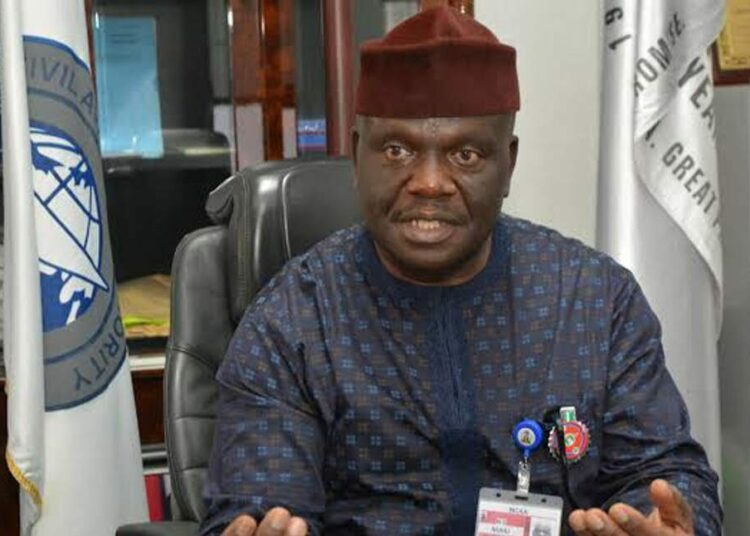As a retired pilot, sir, could you please tell Nigerians about an encounter with an unruly passenger and how you handled the situation?
Fifteen years ago, we had a flight when I was a pilot with Aero Contractors. The flight was from Calabar to Lagos. The weather was bad, we landed, and one passenger got very angry. When we landed, he wanted to come into the cockpit and attack the captain. I mean, he was kind of violent, shouting and screaming. He said he would write in the newspaper, deal with me, ruin my life and career, among other things, but I called security, handed him over to security, and never heard from him again.
So, the issue is we have gaps within the system, we have gaps on the part of the operators, on the part of the airlines, on the part of the airports, on the part of security. The problem is that we don’t make collective decisions during training. All these different parts of the ecosystem are supposed to be trained together so that they can coordinate and work together as a team. But when one side is doing one thing and it’s not communicating correctly with the other side, gaps and issues like these arise.
What is the best way to handle a situation like we had recently?
We are supposed to have a system for dealing with unruly passengers already established on the ground. All airports, airlines, and ground security agents are supposed to have a contingency plan already in place. So, when it happens, you just activate it, and everybody knows what to do and how to deal with the situation. It’s supposed to be a trained and collaborative system, already established on the ground. That’s a big problem.
ICAO has established the Montreal Protocol 2014. When Nigeria signed the Montreal Protocol 2014, Nigeria was the country that made the protocol effective enough for it to be effective. So, once Nigeria signed, we reached several countries that made it effective. That protocol became effective in all countries. Another ICAO document provides a legal framework for unruly passengers, but these things are already established, so we don’t have to reinvent the wheel. There are guidelines, procedures, and policies; we must look at them and ensure they are appropriately implemented.
Looking at what happened on Ibom Air on Tuesday, with your experience as a pilot, what do you think the pilot should have done differently?
Instead of dragging the lady down and exposing a sensitive part of her body, look, as I said, I don’t know, I have not seen the full video. I only saw one part of the video, then I saw another snippet where the lady was talking to the cabin crew. I don’t know what brought that, but for whatever reason, when a passenger gets violent, you need to have security people come and deal with that. The flight crew cannot start fighting with passengers because it is a safety and security issue.
Do you think the way we are handling this issue so far has been swift and of international standards? We can do a lot better, though. Efforts have been made, but there is always room for significant improvement.
Things like this are not good for the industry. They are not good for the country’s image when people are being dragged and forced out, almost stripped naked. It’s not the best. The optics are not good, and it reflects poorly on the industry.
So, there is training on how to deal with this issue. So, there are ways to handle these issues, and first of all, it is to manage and de-escalate the situation. A crew is supposed to be trained on handling unruly passengers, and if the crew cannot manage it and it gets out of hand, then they notify the captain. But if you can restrain the passenger, you restrain the passenger.
You can imagine a passenger going haywire; a flight commotion can be a serious safety issue, a serious security issue on the flight, and the crew will contact security.
Do you think there’s a gap?
Yes, that’s exactly what I’m saying. There is a gap, there is a significant gap in the system between the various parts, and that must be dealt with.
How can this gap be bridged?
There are ICAO documents that deal with that, and just make sure the relevant parties, the civil aviation authority, can use this opportunity to ensure that all the relevant parties develop contingency plans to deal with such issues. Whether it’s the airline, the flight crew, cabin crew training, or dealing with unruly passengers, they must have their policies and procedures and standard reporting procedures.
The airport authorities, too, must have them because an unruly passenger might even be in the airport terminal. So, they should have Standard Operating Procedures (SOPs) on how to deal with these issues.
Also, what I would like to say is that, in addition to that, there needs to be a proper investigation into why we are beginning to have more unruly passenger situations and not just dealing with unruly passenger situations alone.
For instance, we have had three or four really bad cases in the last two to three months, including a serving Senator. We need to determine the underlying issues that create these unruly passenger situations.
Don’t you think there’s selective judgment in the case of the lady on Ibom Air and the popular Fuji musician?
Honestly, I can’t say anything about that. It’s only what I’ve read, and I hope it’s not like that. If that’s the situation, then it’s really bad and unfortunate. Unruly passengers are unruly passengers; you don’t have to hit someone; even verbal aggression is unruly. I mean, just talking to the check-in counter, if you’re rude or verbally aggressive, you may not be allowed on that flight.
Then we have people coming and standing in front of the aircraft. Do you know what that does to Nigeria on the international scene? It means we don’t have any security. That’s a serious issue, and ICAO takes notice of that. It reflects poorly on our country. Those incidents that are reported in the press, ICAO puts them in their registrar. I was a representative for Nigeria in ICAO. It’s terrible. It has serious consequences, and we all know it’s really bad. The system just has to find a way to deal with it.
So, going forward, what should be done?
This is an opportunity for the CAA to ensure that there are proper policies and procedures put in place by the various parties to deal with this issue. And now, we need to develop systems to address that potential. I mean, such behavior is not acceptable because you’re dealing with the lives of people and properties.
But now that the airline, Ibom Air, and the operators have placed a no-fly ban on the lady, some stakeholders and experts say they don’t have the power to do so.
Do you think the AON has the power to place a ban on a passenger? It’s very touching, and I need to check that to make sure before I give misleading comments. I think every operator has the right to defend its property; they have the right; it’s their responsibility to ensure the safety of their flight operations. Every operator is responsible for that, period.






